
|
Regular Meetings Covid Era November Educational Program 44 Winnebago County Forest Preserves in 2022
When the Forest Preserves of Winnebago County announced their challenge to visit all 44 preserves for their centennial year in 2022, he decided to meet the challenge. His personal “rules” were that he had to hike at least a mile or two in each one to claim it as a visit and take enough photos during his hikes that others could share in their natural beauty. Rob will share a selection of the amazing photographs of the forest preserves he visited this year. October Educational Program Bats – Beyond the Myths
Barbara Williams will examine our local bats and the challenges they face. We’ll take a quick tour of the world’s bats and attitudes that people have toward bats in different cultures, look at the risks and benefits of welcoming bats to your landscape, and ways you can accommodate and encourage bats without conflict. The program will include a brief demonstration of a bat detection microphone and recorder that can be used to monitor bat populations. Barbara Williams is a life-long student of natural history with many years of experience as a birder, photographer, and traveler. She worked in Rockford at Burpee Museum’s biology department for about ten years tending and cataloguing the collections, creating exhibits, and preparing specimens of plants, insects, birds, and mammals. Barbara also monitors dragonflies and bumblebees as part of the Forest Preserves of Winnebago County citizen science program.September Roots of Sustainability:
He formerly taught in the landscape architecture program and is a strong advocate of ecologically based design and ecological restoration. He has researched the work of early landscape architects who advocated such an approach to design, especially the work of O.C. Simonds and Jens Jensen who worked throughout the Midwest, including in the Rock River valley, and were known for the “Prairie style” of landscape gardening. Bob is the author of Jens Jensen: Maker of Natural Parks and Gardens and The Native Landscape Reader. He is a Fellow in the American Society of Landscape Architects as well as in the Council of Educators in Landscape Architecture. Bob is also an honorary member of the Garden Club of America and serves as the president of the Ann Arbor Chapter of the Wild Ones. August Invite Nature to Your Yard
Jim began his relationship with The Conservation Foundation over twenty years ago. He has worked on prairie and wetland restoration projects at Warrenville's Johnson School and on several educational endeavors of the Foundation. Jim is also the recipient of the 1999 Paul Butler Memorial Award presented by The Conservation Foundation for outstanding volunteer service. In 2004, Jim joined the staff becoming the new Land Preservation Specialist for The Conservation Foundation. Jim now works to preserve land as open space for The Conservation Foundation. He lectures all over the region on local environmental issues, and actively works with homeowners and business property owners to improve the environmental conditions of their sites. The Conservation@Home program was his idea to teach about sustainable landscaping practices. Jim currently manages the program. This presentation will be presented via Zoom. Information on how to connect to the Zoom presentation is posted on the Chapter website (www.wildonesrrvc.org) and Facebook page and will be distributed via email to members prior to the meeting. The program is free and open to the public. For more information call (815) 222-4414. July Social, Prairie Tour, and Picnic
The morning wagon tour will begin at approximately 10:15 a.m., followed by Ken will be offering a native plant raffle and will be available for questions after which you will be free to walk the prairie on your own. June The Effects of Climate Change on Native Plants and the Wildlife that Depend on Them
Dr. Doug Stotz, from the Field Museum, will discuss these offsets as well as the effects of climate change on native plants, vegetation communities, and the wildlife that depend on them. He will also address the role those urban areas can play in the conservation of plants, animals, and their habitats in the face of climate change, including some thoughts on what people can do in their backyards and local parks. May Identifying the Unknown: Practical Tips to Help You Identify Trees and other Woody Plants It's a Bird Cherry... It's a Planetree... It's a Superform Maple! We have all encountered unfamiliar plants before. Our curiosity leads us to learn more about them. This presentation will help with the first step, identification. We will start by highlighting several botanical features used to identify trees and shrubs. Then, we will introduce some woody plant identification resources that are available for both beginners and experts. Travis Cleveland is an Extension Specialist within the Department of Crop Sciences at the University of Illinois. His primary responsibilities include conducting certification training programs, developing training materials, and revising publications for the University of Illinois Pesticide Safety Education Program. He provides subject matter expertise in landscape horticulture, woody plants, and plant pathology.
Illinois Owls
Peggy Doty is an Educator for University of Illinois Extension specializing in environmental education to relate wildlife related issues and water quality to all ages. She holds a B.S. in Zoology with a specialization in wildlife management. Peggy is interested in human reactions and relationships to wildlife, especially regarding the large predators, and now feral swine, in Illinois. She also holds a M.S. in Education with a specialization in Outdoor Teacher Education/Curriculum and Instruction. Peggy has been teaching environmental education for over 20 years, is passionate about teaching children about their environment, and helping people understand wildlife as it relates to their lives.
March Shade Gardens: Native Plants and Ecological Benefits
Erin Garrett is the Natural Resources, Environment, and Energy Extension Educator for University of Illinois Extension in the southernmost five counties in Illinois - Alexander, Johnson, Massac, Pulaski, and Union counties. In this role, Erin develops and delivers high impact programming to local and statewide audiences to help them develop an appreciation for natural resources and to empower them to make small changes to positively impact the environment. Erin earned her master’s degree in Plant Biology from Southern Illinois University in 2017, where her research focused on the interactions of an invasive legume with native forbs, grasses, and legumes. She earned her bachelor’s degree in Environmental Studies from the College of Saint Benedict in 2015. February The Flora and Fauna of Bell Bowl Prairie and Other Gravel Prairies Presented by Ed Cope
Ed is a popular speaker on the flora of Winnebago County. From Roscoe, Illinois, he is currently the Plants Program Manager & Restoration Project Manager at Coos Watershed Association in Coos Bay, Oregon. Ed learned about the local flora of working for the Forest Preserve District and as the restoration ecologist with the Natural Land Institute. He graduated from Montana State University in 2013 with degrees in land rehabilitation and wildlife habitat ecology and management. January Lee Johnson: A Naturalist’s Life
Lee’s Great Grandfather came to Winnebago County in 1838 and settled near Harrison. His father lost his job and all of his savings during the Great Depression. He worked hard to send Lee and his sister to school where Lee excelled in science and natural history. Growing up in Roscoe near Kinnikinnick Creek, he and his sister explored the creeks, woodlands and wetlands along the Rock River and began his life-long interest in birds. In 10th grade Lee visited the area along the Sugar River known as Colored Sands to look for birds. He later acquired the natural area to protect it from being mined for sand and started the Sand Bluff Bird Observatory, a bird banding station, on the property. In 1974 he sold the land to the Forest Preserve District of Winnebago County, and the southern part became Colored Sands Nature Preserve. Lee served as Director of the Burpee Museum of Natural History from 1985-1997, raising $3.5 million to build a new wing to the museum. Lee has received the Seth B. Atwood Award for Parks and Recreation, the George & Barbara Fell Award, the National Parks and Recreation Award, Service Above Self Award from the Rockford Rotary Club, and the National Audubon Society Presidential Recognition Award. He served on the Natural Land Institute board, Forest Preserve District Board of Commissioners, Girl Scouts of Rock River Valley board, the board of Sinnissippi Audubon Society, and was a founding member of the North Central Illinois Ornithological Society along with his sister who became a renowned bird expert in Arizona.
2022 Event Schedule January 20
February 17
March 17
April 21
May 19
June 16
July 16 (Saturday)
August 18
September 15
October 20
November 17
|
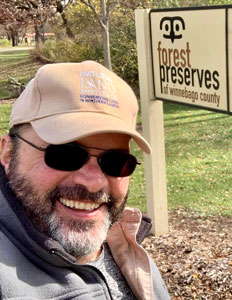 Rob Clark has enjoyed photographing nature since his high school days. In 2020, he retired from teaching mathematics for 27 years at Rock Valley College. Throughout college and his career, he spent time outdoors with his camera. He has been a volunteer at the Nygren Wetland Preserve for the last 20 years, and Nygren remains one of his favorite places to photograph. He recently became a member of the Natural Land Institute’s Board of Trustees and is also a Board member with Nature at the Confluence, and regularly volunteers with Severson Dells’ Canoe Convoys.
Rob Clark has enjoyed photographing nature since his high school days. In 2020, he retired from teaching mathematics for 27 years at Rock Valley College. Throughout college and his career, he spent time outdoors with his camera. He has been a volunteer at the Nygren Wetland Preserve for the last 20 years, and Nygren remains one of his favorite places to photograph. He recently became a member of the Natural Land Institute’s Board of Trustees and is also a Board member with Nature at the Confluence, and regularly volunteers with Severson Dells’ Canoe Convoys.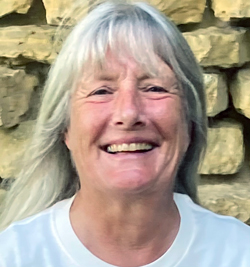 Bats represent one quarter of all mammal species on earth, yet they are widely mis-understood and persecuted. If we look past our prejudices, we see that bats are inextricably linked to the health of our environment and our agricultural systems. Globally they consume huge quantities of crop pests and provide pollination services worth billions of dollars. Locally, bats are busily at work on mosquito control and crop pest reduction, and they ask nothing more than to be left alone to do their work.
Bats represent one quarter of all mammal species on earth, yet they are widely mis-understood and persecuted. If we look past our prejudices, we see that bats are inextricably linked to the health of our environment and our agricultural systems. Globally they consume huge quantities of crop pests and provide pollination services worth billions of dollars. Locally, bats are busily at work on mosquito control and crop pest reduction, and they ask nothing more than to be left alone to do their work.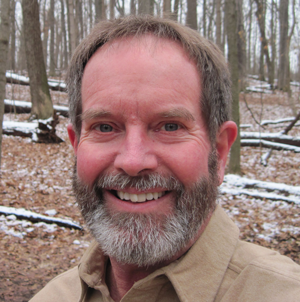 Bob Grese is Professor Emeritus in the School for Environment and Sustainability at the University of Michigan-Ann Arbor and the former director of the University’s Matthaei Botanical Gardens and Nichols Arboretum.
Bob Grese is Professor Emeritus in the School for Environment and Sustainability at the University of Michigan-Ann Arbor and the former director of the University’s Matthaei Botanical Gardens and Nichols Arboretum. 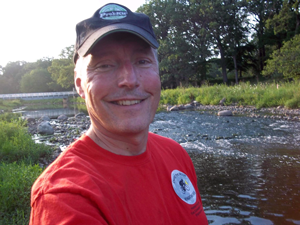 Jim Kleinwachter, the Conservation@Home program director for The Conservation Foundation, will talk about the benefits of planting native plants in our yards. Even though many or most Wild Ones members already have natural gardens, Jim insists that we are in the minority and that we can help this to become more mainstream. Jim will tell us how we can use our native gardens to become beacons in our neighborhoods and the community at large.
Jim Kleinwachter, the Conservation@Home program director for The Conservation Foundation, will talk about the benefits of planting native plants in our yards. Even though many or most Wild Ones members already have natural gardens, Jim insists that we are in the minority and that we can help this to become more mainstream. Jim will tell us how we can use our native gardens to become beacons in our neighborhoods and the community at large.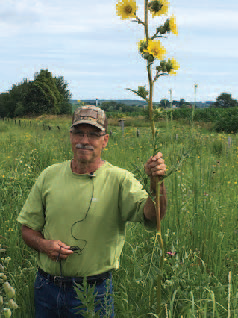 On Saturday July 16, 2022, beginning at 10:00 a.m., we will be touring the restoration prairie and wildlife habitat that RRVC member Ken Keilsmeier has been working on for several years. The prairie restoration is located on the farm of Ken’s friends Mark and Joyce Long and is located at 5788 W Leaf River Rd., Leaf River. They have been restoring a previous cornfield to a native prairie and adding shelter belts of native trees and shrubs to provide wildlife habitat near the prairie. Ken will take us on a tour of the area from a lovely, benched wagon that will give us a prairie-schooner-like view of the prairie in bloom.
On Saturday July 16, 2022, beginning at 10:00 a.m., we will be touring the restoration prairie and wildlife habitat that RRVC member Ken Keilsmeier has been working on for several years. The prairie restoration is located on the farm of Ken’s friends Mark and Joyce Long and is located at 5788 W Leaf River Rd., Leaf River. They have been restoring a previous cornfield to a native prairie and adding shelter belts of native trees and shrubs to provide wildlife habitat near the prairie. Ken will take us on a tour of the area from a lovely, benched wagon that will give us a prairie-schooner-like view of the prairie in bloom. It is now generally accepted that our climate is changing to the detriment of most of life on earth due to an unnatural rise in CO2. It has caused a change in the timing of such natural events as the budding of trees, shrubs, and forbs as well as insect emergence from winter dormancy which ultimately affects nesting birds that depend on insects to feed their nestlings.
It is now generally accepted that our climate is changing to the detriment of most of life on earth due to an unnatural rise in CO2. It has caused a change in the timing of such natural events as the budding of trees, shrubs, and forbs as well as insect emergence from winter dormancy which ultimately affects nesting birds that depend on insects to feed their nestlings. 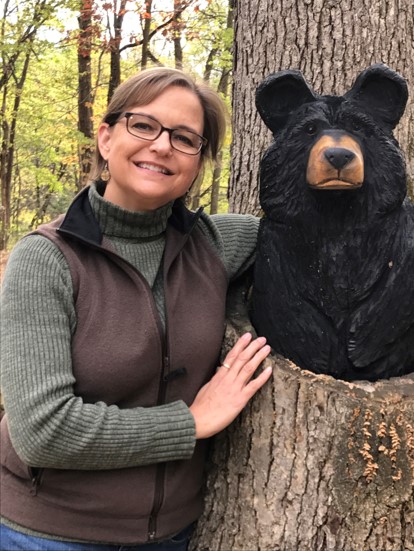 Owls are not only at the top of their food chain; they are also at the top of their game. Owls have one of the most unique set of tools in their predator toolkit, from eyes that can penetrate the darkness to rotating toes, and a feathered satellite dish to pick up the smallest of rodent feet hitting the ground. Owls are also masters of illusion and silence. Join Peggy Doty, Extension Educator, as we peer into the world of the Illinois owls.
Owls are not only at the top of their food chain; they are also at the top of their game. Owls have one of the most unique set of tools in their predator toolkit, from eyes that can penetrate the darkness to rotating toes, and a feathered satellite dish to pick up the smallest of rodent feet hitting the ground. Owls are also masters of illusion and silence. Join Peggy Doty, Extension Educator, as we peer into the world of the Illinois owls. 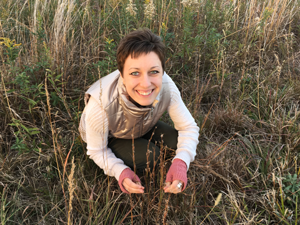 You may have heard about the benefits of planting native plants in your home landscape – but what about in that shady spot in your yard? Are there native plants well suited to a shade garden? Learn the ecological benefits of planting natives underneath trees and explore your options when it comes to choosing shade tolerant native plants.
You may have heard about the benefits of planting native plants in your home landscape – but what about in that shady spot in your yard? Are there native plants well suited to a shade garden? Learn the ecological benefits of planting natives underneath trees and explore your options when it comes to choosing shade tolerant native plants.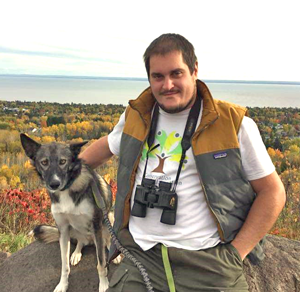 Ed Cope, former Ecologist with the Natural Land Institute, will discuss the flora and fauna of gravel prairies in the Rock River valley, using Bell Bowl Prairie as a specific lens through which to bring the bigger picture of this unique ecosystem into focus. He will review the origin and history of gravel prairies in the area, then discuss the plant and animal species that inhabit them. Particular focus will be given to those species who have disappeared, and those that teeter on the cusp of extirpation. Bell Bowl Prairie is the last local refuge for a large number of species, and its destruction would doubtlessly seal their fate.
Ed Cope, former Ecologist with the Natural Land Institute, will discuss the flora and fauna of gravel prairies in the Rock River valley, using Bell Bowl Prairie as a specific lens through which to bring the bigger picture of this unique ecosystem into focus. He will review the origin and history of gravel prairies in the area, then discuss the plant and animal species that inhabit them. Particular focus will be given to those species who have disappeared, and those that teeter on the cusp of extirpation. Bell Bowl Prairie is the last local refuge for a large number of species, and its destruction would doubtlessly seal their fate.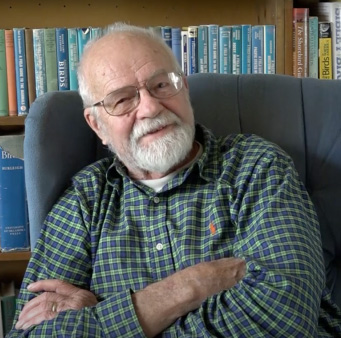 Local naturalist, Lee Johnson, turned 90 years old on December 18, 2021, and sat with WORRV chapter president Jerry Paulson and videographer Charles Johannsen to reflect on the changes to the natural environment he has witnessed during his life. A keen observer of nature and a life-long bird watcher, Lee will share his remembrances during the first program of the New Year at 7:00 P.M. on Thursday, January 20th.
Local naturalist, Lee Johnson, turned 90 years old on December 18, 2021, and sat with WORRV chapter president Jerry Paulson and videographer Charles Johannsen to reflect on the changes to the natural environment he has witnessed during his life. A keen observer of nature and a life-long bird watcher, Lee will share his remembrances during the first program of the New Year at 7:00 P.M. on Thursday, January 20th.